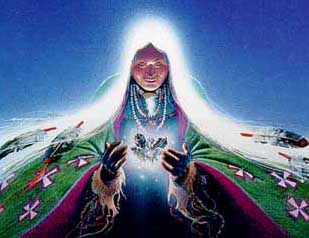
Creation By Women

Creation By Women
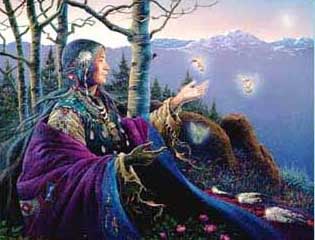
In the beginning there was no earth to live on, but up above, in the Great Blue, there was a woman who dreamed dreams.
One night she dreamed about a tree covered with white blossoms, a tree that brightened up the sky when its flowers opened but that brought terrible darkness when they closed again. The dream frightened her, so she went and told it to the wise old men who lived with her, in their village in the sky.
"Pull up this tree," she begged them, but they did not understand. All they did was to dig around its roots, to make space for more light. But the tree just fell through the hole they had made and disappeared. After that there was no light at all, only darkness.
The old men grew frightened of the woman and her dreams. It was her fault that the light had gone away forever. So they dragged her toward the hole and pushed her through as well. Down, down she fell, down toward the great emptiness. There was nothing below her but a heaving waste of water and she would surely have been smashed to pieces, this strange dreaming woman from the Great Blue, had not a fish hawk come to her aid. His feathers made a pillow for her and she drifted gently above the waves.
But the fish hawk could not keep her up all on his own. He needed help. So he called out to the creatures of the deep. "We must find some firm ground for this poor woman to rest on," he said anxiously. But there was no ground, only the swirling, endless waters.
A hell diver went down, down, down to the very bottom of the sea and brought back a little bit of mud in his beak. He found a turtle, smeared the mud onto its back, and dived down again for more.
Then the ducks joined in. They loved getting muddy and they too brought beaks full of the ocean floor and spread it over the turtle's shell. The beavers helped - they were great builders- and they worked away, making the shell bigger and bigger.
Everybody was very busy now and everybody was excited. This world they were making seemed to be growing enormous! The birds and the animals rushed about building countries, the continents, until, in the end, they had made the whole round earth, while all the time they sky woman was safely sitting on the turtle's back.
And the turtle holds the Earth up to this very day.
-Native American Myths and Legends

In the Land Above The Sky a strong wind uprooted this tree. Skywoman, walking by, fell through the hole left by the tree. As she fell a flock of geese broke her fall and she landed on a giant turtle that rose from the waters. This giant turtle grew in shape and size to form the land. Their Sky woman gave birth to a daughter whose children propagated the human race.
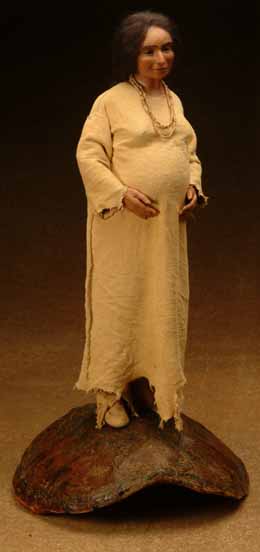
The Woman Who Fell From the Sky

In the beginning there was only one water and the water animals that lived in it.
Then a woman fell from a torn place in the sky.. She was a divine woman, full of power. Two loons flying over the water saw her falling. They flew under her, close together, making a pillow for her to sit on.
The loons held her up and cried for help. They could be heard for a long way as they called for other animals to come.
The snapping turtle called all the other animals to aid in saving the divine woman's life.
The animals decided the woman needed earth to live on.
Turtle said, "Dive down in the water and bring up some earth."
So they did that, those animals. A beaver went down. A muskrat went down. Others stayed down too long, and they died.
Each time, Turtle looked inside their mouths when they came up, but there was no earth to be found.
Toad went under the water. He stayed too long, and he nearly died. But when Turtle looked inside Toad's mouth, he found a little earth. The woman took it and put it all around on Turtle's shell. That was the start of the earth.
Dry land grew until it formed a country, then another country, and all the earth.. To this day, Turtle holds up the earth.
Time passed, and the divine woman had twin boys. They were opposites, her sons. One was good, and one was bad. One was born as children are usually born, in a normal way. But the other one broke out of his mother's side, and she died.
When the divine woman was buried, all of the plants needed for life on earth sprang fromt he ground above her. From her head came the pumpkin vine. Maize came from her chest. Pole beans grew from her legs.
The divine woman's sons grew up. The evil one was Tawis-karong. The good one was Tijus-keha. They were to prepare the earth so that humans could live on it. But they found they could not live together. And so they separated, with each one taking his own portion of the earth to prepare.
The bad brother, Tawis-karong, made monstrous animals, fierce and terrifying. He made wolves and bears, snakes, and patnerhs of giant size. He made mosquitoes huge, the size of wild turkeys. And he made an enormous toad. It drank up the dresh water that was on the earth. All of it.
The good brother, Tijus-kaha, made proper animals that were of use to human beings. He made the dove, and the mockingbird, and the partridge. And one day, the partridge flew toward the land of Tawis-karong.
"Why do you go there?" Tijus-kaha asked the partridge.
"I go because there is no water. And I hear there is some in your brother's land," said the partridge.
Tijus-kaha didn't believe the bird. So he followed, and finally he came to his evil brother's land. He saw all of the outlandish, giant animals his brother had made. Tijus-kaha didn't beat them down.
And then he saw the giant toad. He cut it open. Out came the earth's freash water. Tijus-kaha didn't kill any [more] of his brother's creations.. But he made them smaller, of normal size so that human beings could be leaders over them.
His mother's spirit came to Tijus-kaha in a dream. She warned him about his evil brother. And sure enough, one day, the two brothers had to come face to face. They decided they could not share the earth. They would have a duel to see who would be master of the world.
Each had to overcome the other witha single weapon. Tijus-keha, the good, could only be killing if beaten to death with a bag full of corn or beans. The evil brother could be killed only by using the horn of a deer or other wild animal. then the brothers fixed the fighting ground where the battle would begin.
The first turn went to the evil brother, Tawis-karong. He pounded his brother with a bag of beans. He beat him until Tijus-kaha was nearly dead. But not quite. He got his strength back, and he chased Tawis-karong. Now it was his turn.
He beat his evil brother with a deer horn. Finally, Tijus-keha took his brother's life away. But still the evil brother wasn't completely destroyed.
It is the belief of the Hurons to theis day. When they die, their spirits go to the far west, where they will dwell forever.
The Hurons are a confederacy of American Indians originally of the St.Lawrence Valley. This creation myth falls into the Earth-Diver category. In this type of myth, a being-- sometimes divine, often an animal - dives into the water to bring up small amounts of soil. From this soil, the earth is formed.
- In the Beginning; Creation Stories from Around the World by Virginia Hamilton
Time was, there were no people on earth. The first man still lay inside the pea pod.
Four days passed, and on the fifth day, he pushed with his feet. He broke through the bottom of the pod and fell to the ground. When he got up, he had become a grown man. He looked at eveything and himself, his arms and legs, his hands; felt his neck. The pod that had held him still hung on the vine with a hole in its bottom.
The grown man walked a little away from the pod where he had started. The ground under him felt as if it were moving, too. It was not firm, but soft.
The way it moved under him made him feel sick. He stood still, and slowly a pool of water formed at his feet. He bent down and drank from the pool. It felt good the way the water went from his mouth down inside of him. It made him feel better.
He stood up again, refreshed. Next, he saw something. It was a dark thing flapping along, and it was coming. Then it was there before him. It stood looking at him.
It was Raven. Raven lifted one of his wings and pushed his beak up to his forehead. He raised it like a mask. And when he moved his beak up, Raven changed into a man. He walked all around the first man to get a good look at him.
"Who are you?" Raven asked, at last. "Where did you come from?"
"I came from the pea pod," said the man, pointing to the vine and the broken pod.
"I made that vine!" said Raven. "I never thought something like you would come from it. Here, this ground we're standing on is soft. I made it later than the rest. Let's go to the high ground. It's hard and thick."
Man and Raven went to the high ground, and it was quite hard under them.
"Did you have anything to eat?" Raven asked.
Man told him about the wet stuff that had pooled at his feet.
"Ah, you must have drunk water," Raven said. "Wait here for me."
He drew the beak-mask down and changed once more into a bird. Raven flew up into the sky and disappeared.
Four days later, he returned. The whole time, Man had been waiting.
Raven pushed up his beak and was again a man. He had four berries-- two raspberries and two heathberries.
"I made these for you," he said. "I want them to grow all over the earth. Here, eat them."
Man put the berries in his mouth and ate them.
"I feel better," he said.
Next, Raven took Man to a small creek. There, the man-bird found two pieces of clay and molded them into tiny mountain sheep. He held them on his palm. When they dried, he let Man take a close look at them.
"They look nice," Man said. Raven pulled down his beak and made his wings wave back and forth, back and forth over the clay figures. They came to life and bounded away as grown mountain sheep. Raven lifted his mask.
"Look!" he said.
Man saw the sheep moving very fast. They were full of life, and that pleased him. He thought people would like them. For there were more men growing on the vine.
But when Raven saw the way Man was looking at the mountain sheep with such delight, he put them up high so that people would not kill too many of them.
Raven made more animals, moved his wings, and brought them to life. Every animal and bird and fish that Raven made, Man viewed with pleasure. That worried Raven. He thought he'd better create something Man would fear, or else Man might eat or kill everything that moved.
So Raven went to another creek. He took some clay and created a bear, making it come alive. Quickly, Raven got out of the way of Bear because the animal was so fierce it would tear him apart and maybe eat him.
"You will get lonely if you stay by yourself," Raven said to Man. "So I will make somebody for you."
Raven went off a ways, where he could view Man bt where Man couldn't be sure what he was doing. There, off a ways, he made a figure out of clay much like Man's, although different. He fastened watercress onthe back of its head for hair. When the figure had dried in the palm of his hand, he waved his wings several times. It came to life. It was a lovely woman. She got up, grew up, and stood beside Man.
"That is your helper and your mate," said Raven. Raven went on doing what he needed to do. And Man and Woman had a child. Soon, there were many, many people and animals. All that was living grew and thrived.
This is a wonderful, dramatic Eskimo myth, parts of which are widely known, spread from Siberia to Greenland. The myth speaks of society rather than the universe. Raven is a trickster god who travels from heaven to earth and sometimes, in some stories, to the seafloor. He has sacred power and can change form. Raven instructs people in living. He creates first-man through the pea vine and other people and animals from clay taken from the earth-creek. Eskimo Woman Prophecy
- In the Beginning; Creation Stories from Around the World by Virginia Hamilton
The Uktena is the great serpent of Cherokee tales who lives in the mountains. It has rings or spots of color along its body, is horned, is as large around as a tree trunk, and had once a bright, blazing jewel embedded in its forehead called the Ulunsuti. The Ulunsuti is a rutile quartz which, down one side, has a bright streak of red, making it a very rare specimen of quartz besides being sacred in connection to the Uktena. The Great Serpent lost the jewel at one point and the Cheokee people kept it in their possession.
The Uktena had the power to destroy all that Man held most dear and was so venomous that if he ever looked at someone, that person's whole family would perish. Even to look at it while it was sleeping. He isn't a patron of the Cherokee, but rather, is an enemy to be overcome. The Uktena could only be wounded in the seventh spot from his head because that is where the Uktena's heart was. He is normally slain by a hero in tales.
The reason that the Uktena is a creature of such threat is because he was very jealous and bitter towards Snake. Snake was honored and prayed to, (while the Uktena was not), because Snake had struck the Sun's daughter one day while she was opening the doors to the house for the Sun to come in. The Sun was angry and pained that the people liked Moon more. The people could gaze at Moon easily and did so often, complimenting him on his greatness, but when they looked up at Sun they would squint, make faces, and complain. Sun would have continued to burn the people to death as she had already done to hundreds for punishment. Without Her daughter to let Her come in, however, the people were saved.
But the Moon said, "I like my younger brothers, I think they are handsome."
This was because they always smiled pleasantly at his mild glow in the night sky.
The Sun was jealous of the Moon's popularity and decided to kill the people. Every day when she got near her daughter's house, she sent down such sultry heat that fever broke out and people died by the hundreds. When everyone had lost some friend ands it seemed as if no one would be spared, the humans went for help to the little men. These men, who were friendly spirits, said that the only way the people could save themselves was to kill Sun. The Little Men Made medicine to change two of the humans into snakes, the spreading adder and copperhead, who could hide near the daughter's door and bite the old Sun. The Snakes went up to the sky and lay in wait until the sun arrived for dinner. But when the spreading adder was about to spring, her bright light blinded him and he could only spit out yellow slime, as he does to this day when he tries to bite. The Sun called him a nasty thing and went into the house, and the copperhead was so discouraged that he crawled off without trying to do anything.
The people still dying from the terrible heat, went a second time to the Little Men for help. Again the Little Men made medicine and changed one man into the great Uktena, the water monster, and another into a rattlesnake. As before, the serpents had instructions to kill the old Sun when she stopped at her daughter's house. Uktena was large and fierce, with horns on his head, and everyone thought he would be sure to succeed. But the rattlesnake was so eager that he raced ahead and coiled up just outside the house. When the Sun's daughter opened the door to look for her mother, he struck and she fell dead in the doorway.
Forgetting to wait for the old Sun, he went back to the people, and Uktena was so angry at the rattlesnake's stupidity that he went back too. Since then we pray to the rattlesnake and don't kill him, because he wishes people well and never tries to bite if we don't disturb him. But Uktena grew angrier and more dangerous all the time. He became so venomous that if he even looked at a man, the man's whole family would e. Eventually the people held a council and decided that he was just too dangerous, so they sent him to Galun'lati, the world, where he still is.
When the Sun found her daughter dead, she shut herself up in the house and grieved. Now the people were no longer dying from the heat, but they lived in darkness. Once more they sought help from the Little Men, who said that in order to coax the Sun out, they must bring her daughter back from Tsusgina'i. This is the ghost country, which lies in Usunhi'yi, the Darkening Land in the west. The people chose seven men to make the journey. The Little Men told the seven to take a box, and told each man to carry sourwood rod a handbreadth long. when they got to Tsugina'i, the Little Men explained, they would find all the ghost at a dance. They should stand outside the circle, and when the Sun's daughter danced past them, they must strike her with the rods and she would fall to the ground. Then they could put her in the box and bring her back to her mother. But they must not open the box, not even a crack, until they arrived home.
The seven men took the rods and the box and traveled west for seven days until they came to the Darkening Land. There they found a great crowd of ghost having a dance, just as if they were alive. The Sun's daughter was in the outside circle. As she danced past them, one of the seven men struck her with his rod, and then another and another, until at the seventh round she fell out of the ring. The men put her into the box and closed the lid, and the other ghost never seem to notice what had happened.
The seven took up the box and started home toward the east. In a while the girl came to life again and begged to be let out, but the party went on without answering. Soon she called again and said she was hungry, but they did not reply. When at last the group was very near home, the daughter of the sun cried that she was smothering and begged them to raise the lid just a little. Now they were afraid that she was really dying, so they barely cracked the lid to give her air. There was a fluttering sound, and something flew past them into the bushes. Then they heard a redbird cry, "Kwish!Kwish!Kwish!" Shutting the lid, they went on again. But when they arrived at the settlements and opened the box, it was empty.
So we know that the redbird is the daughter of the Sun. And if the party had kept the box closed, as the Little Men told them to, they could have brought her home safely, and today we would be able to recover our friends from the Ghost Country. Because the seven opened the box, however, we can never bring back people who die.
The Sun had been hopeful when the party had started off for the Darkening Land, but when they came back without her daughter, she wept until her tears caused a great flood. Fearing that the world would be drowned, the people held another council and decided to send their handsomest young men and women to amuse the Sun and stop her crying. This group danced before her and sang their best songs, but for a long time she kept her face bowed and paid no attention. At last when the drummer suddenly changed the song, she looked up and was so pleased at the sight of the beautiful young people that she forgot her grief and smiled.
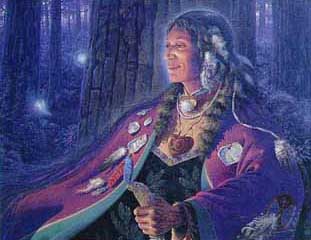

"Now shut your eyes," Raven told him. Man did close his eyes.
"She is very pretty," said Man, and he was happy.
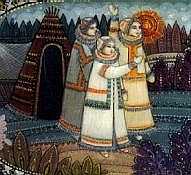
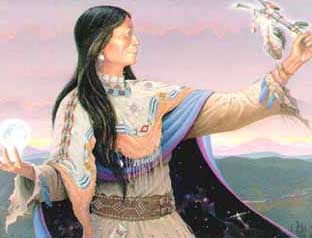

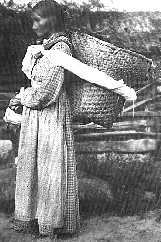
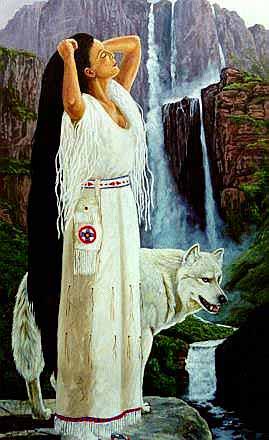
The Sun lived on the other side of the sky vault, but her daughter lived in the middle of the sky, directly above the Earth. Every day as the sun was climbing along the sky arch to the west, she used to stop at her daughters house for dinner. Now, the Sun hated the people of this Earth, because they never looked straight at her without squinting. She said to her brother, the Moon, "My grandchildren are ugly, they screw up their faces whenever they see me.
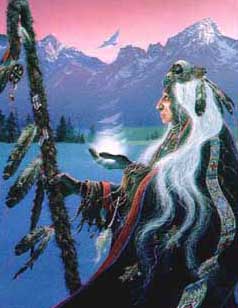
NATIVE AMERICAN CREATION MYTHS